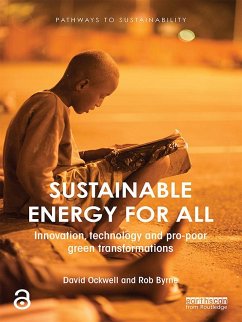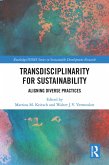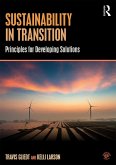Dieser Download kann aus rechtlichen Gründen nur mit Rechnungsadresse in A, B, BG, CY, CZ, D, DK, EW, E, FIN, F, GR, HR, H, IRL, I, LT, L, LR, M, NL, PL, P, R, S, SLO, SK ausgeliefert werden.
"This is a highly significant book and should be read by anybody interested in the challenges surrounding the pursuit of expanded access to modern energy services and low carbon transitions in the so-called developing world. Eschewing the dominant foci on hardware financing and private sector entrepreneurship, Dave Ockwell and Rob Byrne call for a much more nuanced and systemic understanding of how transformative change might be achieved. They emphasize in particular that sustainable energy access must be seen as an explicitly political problem "with solutions that are themselves political as much as they are financial, technical or social." I am one hundred percent in agreement with them." - Ed Brown, Co-Chair of the Low Carbon Energy for Development Network and Senior Lecturer in Geography, University of Loughborough, UK
"The book is a must read for all who are interested in the transitions to low carbon economies, especially in the energy sector. The Socio-Technical Innovation System Building proposed provides an alternative theoretical perspective for understanding the dynamics of emerging clean energy technologies in emerging countries." - Kevin Urama, Senior Advisor to the President on Inclusive and Green Growth, African Development Bank
"This book is a thoughtful, timely, and very useful addition to the literature pertaining to the transfer, development, and adoption of sustainable energy technologies (and, indeed, other technologies with similar attributes), which in turn is critical to the attainment of climate and other sustainable development goals. Drawing on detailed empirical research on the solar PV market in Kenya as well as the literature on innovation systems and socio-technical transitions, Ockwell and Byrne's analysis will make a significant contribution both to the theoretical discussions and the growing practical efforts to effectively deliver sustainable energy technologies for the poor." - Ambuj Sagar, Vipula and Mahesh Chaturvedi, Professor of Policy Studies, Indian Institute of Technology, Delhi, India
"Translating the rhetoric of 'sustainable energy access for all' into reality requires that we understand the political and economic work involved in the process of innovation and the reasons for its success and failure. Sustainable Energy for All gives us a new and unique insight into these processes as they are unfolding in Kenya and beyond, giving us the insights needed to understand how to realise the potential of energy transitions in Africa." - Harriet Bulkeley, Professor of Geography, Durham Energy Institute, University of Durham, UK
"The challenge of progressing towards a pro-poor, green and sustainable energy pathway in Africa is a pressing development question today. And yet, we lack the conceptual tools and empirical analysis that support socially informed policies for transformative change. Ockwell and Byrne have done us a tremendous service in meticulously unpacking the interdependencies between the social context and innovation opportunities for energy access in Africa. This is a must read for anyone concerned with the issues of the African energy project - written with clarity and persuasive logic." - Yacob Mulugetta, Professor of Energy and Development Policy, Department of Science, Technology, Engineering & Public Policy (STEaPP), University College London, UK









